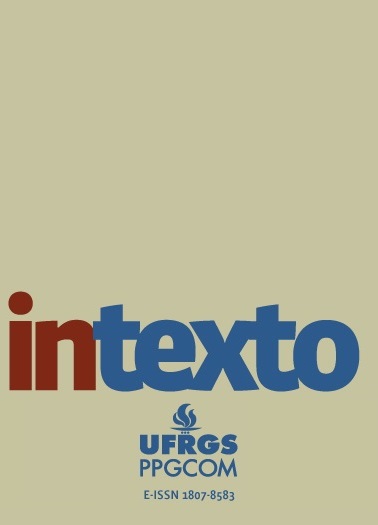Long live the new flesh
grotesque and biopolitics in Cronenberg
DOI:
https://doi.org/10.19132/1807-8583.56.133928Keywords:
posthumanism, identity, technology, cinema, content analysisAbstract
The objective is to present the category of political grotesque. It starts from the hypothesis that this is embedded in the existing concepts of grotesque (eschatological, shocking, teratological, and critical). The content analysis method is used to organize and articulate the two research plans: the theoretical: based on authors such as Bakhtin, Sodré, and Paiva, who studied the grotesque in literature and communication; and the empirical: from film Videodrome, in our interpretation, presents itself as a critique of the biopolitical order. It is concluded that the political grotesque constitutes a central resource for understanding the works of Cronenberg and others who criticize the mind as a prison of the body.
Downloads
References
A MOSCA. Direção: David Cronenberg. Canadá, Estados Unidos: Brooksfilme, 1986. DVD
(96 min), son., color.
BAKHTIN, M. A cultura popular na Idade Média e no Renascimento: o contexto de François Rabelais. São Paulo: Hucitec, 1999.
BALTAR, M. Tessituras do excesso: notas iniciais sobre o conceito e suas implicações tomando por base um Procedimento operacional padrão. Significação: Revista de Cultura Audiovisual, São Paulo, v. 39, n. 38, p. 124-146, 2012. Disponível em:
https://doi.org/10.11606/issn.2316-7114.sig.2012.71141. Acesso em: 16 jan. 2014.
CAPISTRANO, T. As entranhas do cinema: abrindo Cronenberg. In: O cinema em carne viva: David Cronenberg. Rio de Janeiro: Wset Multimídia e Editora, 2011. p. 7-14.
CAPISTRANO, T. (org). O cinema em carne viva: David Cronenberg. Rio de Janeiro: Wset Multimídia e Editora, 2011.
COSMOPOLIS. Direção: David Cronenberg, Distribuição Imagens Filme, 2012. DVD (105 min), son., color.
CRASH: estranhos prazeres. Direção: David Cronenberg. Canadá, Inglaterra: Alliance
Communications Corporation, 1996. DVD (100 min), son., color.
CRONENBERG, D; RODLEY, C. (ed.) Cronenberg on Cronenberg. 2 ed. London: Faber and Faber, 1997.
DELEUZE, G. Conversações, 1972 – 1990. Rio de Janeiro: Editora 34, 1992.
DELEUZE, G; GUATTARI, F. O que é a filosofia? São Paulo: Editora 34, 1992.
ESPOSITO, R. Le persone e le cose. Roma: Einaudi, 2014.
FERRAZ, M. C. F. O Cinema Maquínico de David Cronenberg. In: CAPISTRANO, T. (org). O cinema em carne viva: David Cronenberg. Rio de Janeiro: Wset Multimídia e Editora, 2011. p. 77-80.
FOUCAULT, M. Dits et Écrits IV (1954-1988). Paris: Gallimard, 1994.
FOUCAULT, M. Nascimento da Biopolítica. Curso no Collège de France (1978-1979). São Paulo: Martins Fontes, 2008.
FOUCAULT, M. Vigiar e punir: nascimento da prisão. Petrópolis: Vozes, 1997.
HARAWAY, D. Manifesto ciborgue: ciência, tecnologia e feminismo-socialista no final do século XX. In: HARAWAY, D.; KUNZRU, H.; TADEU, T. (org.). Antropologia do ciborgue: as vertigens do pós-humano. 2 ed. Belo Horizonte: Autêntica, 2000.
HARDT, M; NEGRI, A. Império. Rio de Janeiro: Record, 2001.
MEDEIROS, R. F. Cinema e identidade cultural: David Cronenberg questionando limites.2008. Tese (Doutorado em Literatura Comparada) - Programa de Pós-Graduação em Letras, Instituto de Letras, Universidade Federal do Rio Grande do Sul, Porto Alegre, 2008.
MORAES, R. Análise de conteúdo. Revista Educação, Porto Alegre, v.22, n. 37, p. 7-32, 1999.
PELBART, P. P. Vida Capital: ensaios de biopolítica. São Paulo: Iluminuras, 2003.
PERNIOLA, M. O sex appel do inorgânico. São Paulo: Studio Nobel, 2005.
PETERS, J. D. Speaking into the air: a history of the idea of communication. Chicago: The University of Chicago Press, 2000.
SCANNERS. Direção: David Cronenberg. Canadá: Canadian Film Development Corporation, 1981. (103min), son., color.
SODRÉ, M; PAIVA, R. O império do grotesco. Rio de Janeiro: Mauad, 2002.
VIDEODROME: síndrome do vídeo. Direção: David Cronenberg. Canadá: Famous Players, 1983. 1 DVD (87 min), son., color.
VIEIRA, J. L.; COELHO, L. A. Subjetividade virtual em “nova carne”: o fim do tempo, espaço e corpo orgânico no sujeito recriado”. In: CAPISTRANO, T (org). O cinema em carne viva: David Cronenberg. Rio de Janeiro: Wset Multimídia e Editora, 2011.
WOLF, M. Teorias das comunicações de massa. São Paulo: Martins Fontes, 2008.
YARZA. F. I. S. Diccionario Griego Español. Barcelona: Ramon Sopena, 1945.
Downloads
Published
How to Cite
Issue
Section
License
Copyright (c) 2024 Eduardo Yuji Yamamoto, Douglas Meurer Kuspiosz

This work is licensed under a Creative Commons Attribution-NonCommercial 4.0 International License.
The copyright of works published in this journal belong to the authors, and the right of first publication is conceded to the journal. Due to the journal being of open access, the articles are of free use in research, educational and non-commercial activities.
Therefore, the journal uses the License Creative Commons Attribution (CC BY-NC 4.0), which allows sharing of work with acknowledgment of authorship.
Self-archiving (repository policy): authors are allowed to deposit all versions of their work in institutional or thematic repositories without embargo. It is requested, whenever possible, that the full bibliographic reference of the version published in Intexto (including the DOI link) be added to the archived text.
Intexto does not charge any article processing fees (article processing charge).















